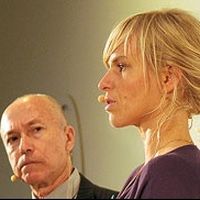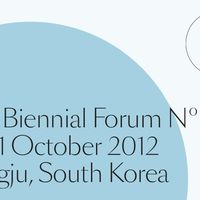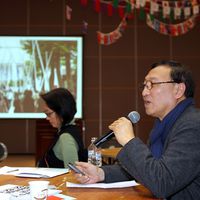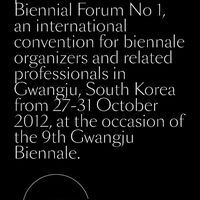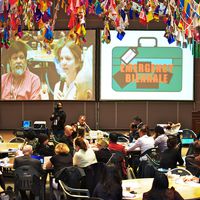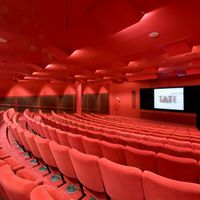World Biennial Forum No.1 | Diary: day 1 and 2
 culture360.org writer and correspondent Veeranganakumari Solanki shares her thoughts and impressions on the World Biennial Forum No. 1, which took place in Gwangju, South Korea.
culture360.org writer and correspondent Veeranganakumari Solanki shares her thoughts and impressions on the World Biennial Forum No. 1, which took place in Gwangju, South Korea.Day 1: 27th October 2012
9th Gwangju Biennale: Roundtable | Opening Ceremony of World Biennale Forum, No. 1
Gwangju, the Biennale city – Having arrived here a day before the first World Biennial Forum began; I had a chance to see the 9th Gwangju Biennale – Roundtable. Roundtable has been curated by six Asian co-artistic Directors – Nancy Adajania, Wassan Al-Khudairi, Mami Kataoka, Sunjung Kim, Carol Yinghua Lu, Alia Swastika – who in the introduction to their Biennale mention that, “While it operates simultaneously on many levels, one thing is quite clear: ROUNDTABLE, the 9th Gwangju Biennale, is not about unanimity.” Establishing this at the very beginning, there is a reference to the metaphor of a ROUNDTABLE in traditional Korean culture, around which people eat and share their ideas, thoughts and meal; while also making each of their experiences personal by the preference of choice from the variety available.
The 9th Gwangju Biennale has evolved in a similar manner, where there are six sub-themes of the Roundtable from which, the viewers can borrow thoughts to create their own personal rendering. From Logging In and Out of Collectivity; Re-visiting History and Transient Encounters to Intimacy, Autonomy and Anonymity; Back to the Individual Experience and Impact of Mobility on Space and Time; the Roundtable develops a challenging palette of six minds that comes together in the viewers’ minds as they create an impression of choice from the six galleries in the main Biennale hall. There are also some alternative venues of the Biennale around the city of Gwangju. I had a chance to visit the Mugaksa Temple; where the five works of Jyeon Kim, Dane Mitchell, Anri Sala, Wolfgang Laib and U Sunok; revisit the viewers’ experience and realisation of the five human senses. This clear consciousness draws a unanimous perspective of the variety that is contained within the Gwangju Biennale’s Roundtable.
The Gwangju Biennale Foundation has been a path-breaker and responsible for several firsts – from Asia’s first international Biennale (1995), to now hosting the first World Biennale Forum in collaboration with the Biennial Foundation.
The evening of the 27th, saw the official opening of the first World Biennial Forum, which was inaugurated with a Korean music performance, followed by a brief introduction and support by the mayor of Gwangju; and introductory speeches by the President of the Gwangju Biennale, Dr. Yongwoo Lee; the Director of the Biennale Foundation; Marike van Hal; Elke aus dem Moore, Head of visual Arts, IFA (also collaborating with the Biennale Foundation in support of the WBF); the directors of the first World Biennale Forum, Ute-Meta Bauer and Hou Hanru; and the other keynote speakers of the Forum. The opening reception was the beginning of an informal dialogue that was taken forward the following day.
Day 2: 28th October 2012
World Biennale Forum – Stage Design | Introductory speeches | Keynote speech by Professor Wang Hui | Case-studies 1, 2, 3 | Hans Ulrich Obrist (interview) | Interactive session
Unique, and the first of its kind, the World Biennale Forum venue and stage at the Kim Dae-Jung centre was designed by the internationally acclaimed Korean artist Choi Jeong Hwa. The artist had placed chairs on the main stage signifying the audience as the focal point of the Forum. The podiums and screens were shifted to the opposite end of the hall – quite like the theme – Shifting Gravity. The ceiling was a celebration of various countries flags, which represented the world-wide audience attending and participating in this first World Biennale Forum. There were not the typical rows of chairs, but an informal group of roundtables with plastic chairs, that created various focal and meeting points, much like a Biennale would do.
There were introductory speeches by the main representatives and directors of the Forum, and René Block (the Guest of Honour) who through his opening comments established this as not being a World Biennale Forum; but “World Biennial Forum No. 1 – so there will be more to follow.” Marike van Hal, spoke about the importance and requirement of the Forum to create an international Biennale network and create new parameters for collaborative projects in the future. Ute Meta Bauer and Hou Hanru described Shifting Gravity as a reflection of globalisation and Asia’s growing margins with a shift of focus to the continent.
On the first day of discussions, there was a keynote speech by Professor Wang Hui, followed by three groups of case-studies of Biennales and Hans Ulrich Obrist’s famous interview performance.
Professor Wang Hui, spoke about The Decline of Representation: Another Inquiry on the Equality of What; describing “art is about everything and everything is about art... and the radical cosmopolitan only exists in the spirit of art.” He also addressed the crucial issue of democratic policies, which were later discussed at various levels during the Forum with reference to different Biennale structures.
The three case studies presented were:
- Case study 1| Asia-Pacific – Part a| Asia-Pacific Triennial, Jogja Biennale, Sydney Biennale
- Case study 2 | Asia-Pacific – Part b | Shanghai Biennale, Taipei Biennale, Yokohama Triennale, Kobe Biennale
- Case study 3 | Architecture-Design-Infrastructure | Istanbul Design Biennale, Shenzhen & Hong Kong Bi-city Biennale of Urbanism-Architecture, Gwangju Design Biennale, Guangzhou Triennial
Case-studies 1 & 2 discussed the history of art in Asia and the Pacific region and an important aspect covered was the shift in focus to Asia and the Middle-East. The history of Biennales was also a crucial point in relation to discussing the development of Biennales in the Asia-pacific region and their possible focus in the future in relation to the geo-political, economic and dynamic art discourse coming out of the Asian region. Through this discussion, also arose the issue of identity, form of representation and the reaction and relationship with governing bodies. There were and still are, questions about the borders of Asia, which are constantly shifting to include and exclude. There is a Shifting Gravity – how does one establish the identity of a biennale?
Case-study 3, related to architecture and design, concentrated on the sustainability of Biennales and their infrastructure. This case-study also questioned the vital importance of representation and creating archives. All three case-studies also realised the importance of audience participation and interaction. The activation of opportunities with and for the public was further discussed on the following day of the Forum too.
The session ended with Hans Ulrich Obrist’s famous interview performance with Korean artists – Moon Kyungg Won and Chun Jun Ho about their work at Documenta13 and their plans for the future. Obrist also spoke about the proliferation of Biennales with notions of Utopia; and the possibility of Biennales being attached to collections for them to continue to survive by introducing “new rules to the game”. This interview brought about an artist’s voice and perspective in relation to the Biennale, which was very important, since within the system of Biennales functioning, the role of the artist in the success of a Biennale is also extremely significant.
During the interactive session, which ended Day 2 of the World Biennale Forum, there was an overarching debate of art expressing diversity, and how biennales served as important cultural institutes and venues for larger discourse in the future. Do biennales act as a platform to project issues related to democracy and governments? What is the social culture of a Biennale and how does one resist commodification? Along with these concerns, there were also questions raised about the need of the possibility of Biennales re-defining themselves; their existence and their role in the future.
The 1st World Biennial Forum is an international convention, the first of its kind for biennale organizers and related professionals that will take place in Gwangju, South Korea coinciding with Roundtable - the 9th Gwangju Biennale (September 7 – November 11, 2012). It is supported by the Asia-Europe Foundation as part of the programme Creative Encounters: Cultural Partnerships between Asia and Europe.
Similar content
from - to
27 Oct 2012 - 31 Oct 2012
from - to
06 Jun 2012 - 06 Jun 2012

